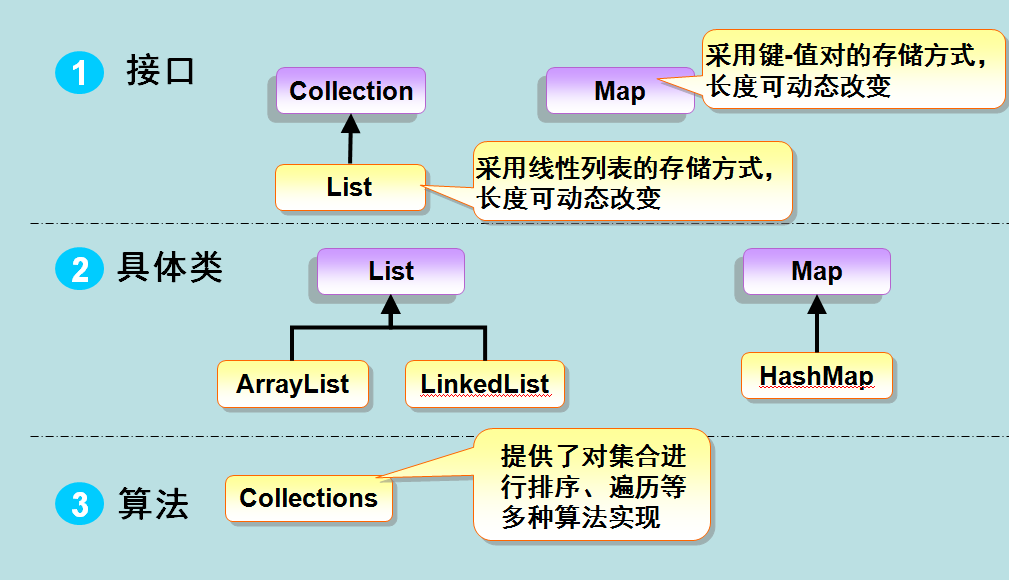Java入门学习- 理解List和HashMap和HashTable的用法和区别
来源:互联网 发布:学生管理系统报告c语言 编辑:程序博客网 时间:2024/06/01 09:49
一、 List、HashMap和HashTable的关系与区别
- List是接口,特性是按顺序,可以重复
- HashMap,实现了map接口,是键值对(key-value)
- HashTable ,实现了map接口。继承于dictionary,他与HashMap的区别可以从下面的引用总结为一下几点:
- HashTable是同步支持多线程的。HashMap不支持,但是Jdk1.5之后,ConcurrentHashMap支持了。
- HashTable不允许null键和值,HashMap允许
- HashMap是HashTable轻量级的实现
下图可以很清楚的说明List和HashMap的关系 
HashMap和HashTable我引用了下面一段话
HashMap和Hashtable都实现了Map接口,但决定用哪一个之前先要弄清楚它们之间的分别。主要的区别有:线程安全性,同步(synchronization),以及速度。
HashMap是非synchronized,而Hashtable是synchronized,这意味着Hashtable是线程安全的,多个线程可以共享一个Hashtable;而如果没有正确的同步的话,多个线程是不能共享HashMap的。Java 5提供了ConcurrentHashMap,它是HashTable的替代,比HashTable的扩展性更好。
另一个区别是HashMap的迭代器(Iterator)是fail-fast迭代器,而Hashtable的enumerator迭代器不是fail-fast的。所以当有其它线程改变了HashMap的结构(增加或者移除元素),将会抛出ConcurrentModificationException,但迭代器本身的remove()方法移除元素则不会抛出ConcurrentModificationException异常。但这并不是一个一定发生的行为,要看JVM。这条同样也是Enumeration和Iterator的区别。
由于Hashtable是线程安全的也是synchronized,所以在单线程环境下它比HashMap要慢。如果你不需要同步,只需要单一线程,那么使用HashMap性能要好过Hashtable。
HashMap不能保证随着时间的推移Map中的元素次序是不变的。
hashMap去掉了HashTable 的contains方法,但是加上了containsValue()和containsKey()方法
二、List、HashMap和HashTable的小例子
//ArrayList的栗子public class CollectionTest { public static void main(String[] args) { Collection<String> c =new ArrayList<String>(); //ArrayList属于Collection,所以可以用它的声明 c.add("张三"); c.add("李四"); c.add("王五"); System.out.println(c); Collection<String > d=new ArrayList<String>(); d.add("赵六"); d.add("冯七"); c.addAll(d); //添加其他ArrayList System.out.println(c); c.addAll(c); //添加自己 System.out.println(c);//由此说明List只是有序,但是可以重复 System.out.println("c是否完全包含着d:"+c.containsAll(d)); //是否包含另一个ArrayList System.out.println("c是否包含着赵六:"+c.contains("赵六")); //迭代器遍历 Iterator it=c.iterator(); while(it.hasNext()){ System.out.print(it.next()+"--"); } /* * iterator遍历性能次之,最好为 * for(int i = 0; i < list.size(); i++) { list.get(i); //因为collection没有get()方法,所以若需要用,就改为List<String> c =new ArrayList<String>(); } */ System.out.println(); c.removeAll(d); //删除数组列表d System.out.println(c); c.remove("李四");//会删除第一个遇到的李四 System.out.println(c); Collection<String> f=new ArrayList<String>(); f.add("王五"); c.removeAll(f);//这样就会删除所有的王五,但是不能这样写c.removeAll("王五"); System.out.println(c); c.clear(); //清空c System.out.println(c); }}// 输出/*[张三, 李四, 王五][张三, 李四, 王五, 赵六, 冯七][张三, 李四, 王五, 赵六, 冯七, 张三, 李四, 王五, 赵六, 冯七]c是否完全包含着d:truec是否包含着赵六:true张三--李四--王五--赵六--冯七--张三--李四--王五--赵六--冯七--[张三, 李四, 王五, 张三, 李四, 王五][张三, 王五, 张三, 李四, 王五][张三, 张三, 李四][]*///HashMap和HashTable的栗子public class HashMapTest { public static void main(String[] args) { Map m=new HashMap<String,String>(); m.put("sky","blue"); m.put("tree", "green"); m.put("flower", "red"); m.put("balana","yellow"); System.out.println(m.values()); //输出所有的值,返回的是一个集合,[blue, yellow, green, red] System.out.println(m.keySet());//输出所有的键,返回一个set():[sky, balana, tree, flower]。因为set是不允许重复的,体现了键的唯一性 System.out.println(m.hashCode());//返回m特有的hashcode:859049909 System.out.println(m.equals(m));//判断是是否相等:true System.out.println(m.entrySet());//输出键值对:[sky=blue, balana=yellow, tree=green, flower=red] System.out.println(m.get("tree"));//通过键得到值:green System.out.println(m.remove("flower")); //删除,会返回删除键的值:red System.out.println(m);//删除成功:{sky=blue, balana=yellow, tree=green} //下面为hashtable,确实两个类的方法都差不多 Hashtable t=new Hashtable<String,String>(); t.put("sky","blue"); t.put("tree", "green"); t.put("flower", "red"); t.put("balana","yellow"); System.out.println(t.values()); //[green, red, yellow, blue] System.out.println(t.keySet());//[tree, flower, balana, sky] }}三、学习过程中,看到两篇文章特别好,做个记录
1、HashMap底层实现原理/HashMap与HashTable区别/HashMap与HashSet区别 (面试题部分写得很好)
http://www.cnblogs.com/beatIteWeNerverGiveUp/p/5709841.html
2、HashMap对HashCode碰撞的处理
http://blog.csdn.net/caisini_vc/article/details/52452498
介于现在知识广度不够和时间太少, 只是粗略看了一下,没有仔细分析。之后有时间再加深深度
- Java入门学习- 理解List和HashMap和HashTable的用法和区别
- Java入门:Hashtable和HashMap的区别
- JAVA中HashMap和HashTable 的理解
- HashMap和Hashtable的区别 ---学习笔记
- Java学习之HashMap和Hashtable的区别
- Java学习之HashMap和Hashtable的区别
- Java学习笔记之HashMap和Hashtable的区别
- Java学习之HashMap和Hashtable的区别(转)
- 【JAVA学习】——hashmap和hashtable的区别
- Java 的Hashtable和HashMap的区别
- Java的HashMap和HashTable的区别
- Java中的HashTable和HashMap的区别
- java中hashmap和hashtable的区别
- java中hashmap和hashtable的区别
- Java中HashTable和HashMap的区别
- java中hashmap和hashtable的区别
- Java中hashmap和hashtable的区别
- java中hashMap和hashtable的区别
- Opevswitch总体架构
- 从此编写 Bash 脚本不再难
- MapReuce 算法设计--Combiner 和 In-Mapper Combing
- 从程序员到项目经理(18):不要试图和下属做朋友
- iOS 项目中包含多个 FFMPEG 方法冲突的通用解决办法。
- Java入门学习- 理解List和HashMap和HashTable的用法和区别
- Nginx location模块整理
- J
- 多线程之匿名内部类实现
- 调整队形
- java 线程池
- 【BZOJ3295】动态逆序对(CQOI2011)-CDQ分治:三维偏序
- js如果在function之前加上感叹号 (!) 等运算符是什么作用
- OnComponentBeginOverlap.AddDynamic 的编译错误【UE4】


